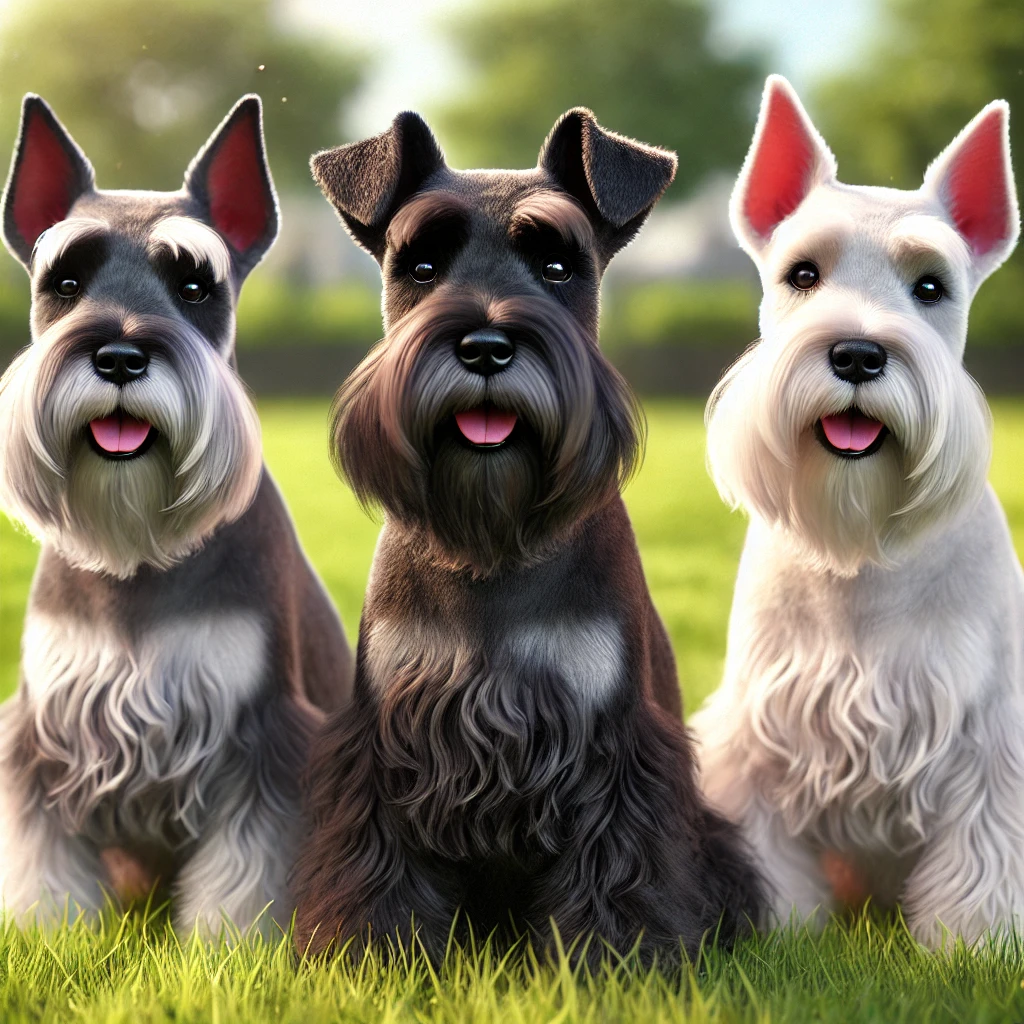miniature schnauzer

The Miniature Schnauzer is a breed that captivates with its boundless energy and expressive eyes, yet behind its playful demeanor lies a need for attentive care. This breed, developed in Germany in the late 19th century as a smaller version of the Standard Schnauzer, excels in a family environment and offers robust companionship. This guide aims to equip schnauzer owners with detailed information on maintaining the health, happiness, and longevity of these charming dogs.
Detailed Breed Overview of Miniature Schnauzers
Origins and Characteristics
The schnauzer, part of the terrier family, was originally bred for farm work, particularly for hunting rats. Today, this breed stands out with its distinctive appearance and spirited personality.
Physical Attributes
Typically weighing between 10-15 pounds and standing about 12-14 inches tall, schnauzers are compact and muscular. They possess a double coat; the outer layer is wiry and the undercoat is soft, which requires specific grooming needs. Their life expectancy generally ranges from 12 to 15 years, showcasing their robust nature.
Color Variations
Miniature Schnauzers come in several colors: predominantly black, salt and pepper, black and silver, and sometimes white. Each hue requires the same level of care despite the color differences.

In-Depth Health Considerations for Miniature Schnauzers
Common Health Issues
Pancreatitis
Miniature Schnauzers have a predisposition towards pancreatitis, often due to their diet. Symptoms such as vomiting, severe abdominal pain, and lethargy require immediate veterinary attention. Preventive measures include a low-fat diet and regular health check-ups.
Diabetes
Given their risk for diabetes, monitoring their sugar intake and ensuring regular veterinary blood tests is vital for early detection and management.
Bladder Stones
These are relatively common in Miniature Schnauzers and can cause significant discomfort and health complications. Treatments include dietary changes or, in severe cases, surgical intervention.
Genetic Disorders
Progressive Retinal Atrophy (PRA)
This genetic condition leads to the gradual deterioration of the eyesight, ending in blindness. Regular eye exams can help detect early signs and slow progression.
Myotonia Congenita
Myotonia Congenita is a rare disorder affects the muscles, making them more rigid. While there is no cure, management includes medication and supportive care to ensure the dog’s comfort.
Preventative Measures
Routine health screenings and genetic testing are essential to managing and preventing severe conditions in Miniature Schnauzers.
Comprehensive Care Requirements of Miniature Schnauzers
Nutrition
The diet of a Miniature Schnauzer should be carefully calibrated to avoid common health issues. High-quality dog food that supports their energetic lifestyle while managing weight and reducing fat intake is recommended.
Exercise
To manage their high energy levels, Miniature Schnauzers require regular exercise routines that include walks, runs, and mental stimulation activities. These activities not only help in maintaining physical health but also in strengthening the bond between the dog and its owner.
Tips
Discover the lifespan of guinea pigs and how you can extend their joyful companionship with proper care and attention!
Grooming
Regular grooming is crucial for maintaining their coat’s health and overall comfort. This includes brushing several times a week, regular trimming every few weeks, and routine ear cleaning to prevent infections.
Training
Due to their intelligence and sometimes stubborn nature, Miniature Schnauzers benefit from early and consistent training. Positive reinforcement techniques are particularly effective.
Special Considerations for Miniature Schnauzer Owners
Behavioral Traits
Understanding the breed’s alert and spirited disposition is crucial for effective training and socialization. They generally interact well with children and other animals if introduced properly and socialized from an early age.
Environmental Adaptations
Miniature Schnauzers are versatile in their living arrangements. They can thrive in both apartments and houses, provided they have enough space to move around and play.
Conclusion: Ensuring a Fulfilling Life for Miniature Schnauzers
Miniature Schnauzers are more than just pets; they are loyal companions that bring joy and energy into the lives of their owners. By following this detailed guide on health and care, owners can ensure that their Miniature Schnauzers enjoy a healthy, active, and happy life. Regular vet visits, a balanced diet, and plenty of love and care are fundamental to the wellbeing of this vibrant breed.
Are Miniature Schnauzers Good Pets?
Miniature Schnauzers are excellent pets for a variety of households. They are intelligent, energetic, and have a friendly nature, making them suitable for families, singles, and seniors alike. They are known for their loyalty and protective nature, often forming strong bonds with their owners. Their manageable size and adaptability also make them good candidates for both apartment living and homes with yards.
What are the Disadvantages of Miniature Schnauzers?
While Miniature Schnauzers make delightful companions, there are some disadvantages to consider:
Barking: They tend to bark a lot, which can be a problem in noise-sensitive environments.
Grooming Needs: Their wiry coat requires regular grooming, including brushing, stripping, or clipping, which can be time-consuming or costly if done professionally.
Stubbornness: Their intelligence can sometimes translate into stubbornness, requiring consistent and patient training.
Health Issues: Like many purebred dogs, they are prone to certain genetic health issues, such as pancreatitis and diabetes.
Do All Mini Schnauzers Bark a Lot?
Not all Miniature Schnauzers bark excessively, but the breed is known for being quite vocal. They tend to bark at perceived threats or to alert their owners to visitors, which makes them excellent watchdogs. However, with proper training and socialization, excessive barking can be managed effectively.
What is the Most Common Cause of Death in Miniature Schnauzers?
The most common causes of death in Miniature Schnauzers are typically age-related, with cancer and organ failure being prominent in older dogs. Heart disease is also a significant cause of mortality in the breed. Regular veterinary care and a healthy lifestyle can help prevent some of these issues and extend a dog’s life.
Do Schnauzers Have a Lot of Health Problems?
Miniature Schnauzers do have a predisposition to certain health problems, but not necessarily more than other breeds. Common health concerns include pancreatitis, diabetes, and urinary stones. Proper diet, regular exercise, and routine veterinary checkups can help manage and mitigate many of these conditions.
What Dog Breed Has the Least Health Problems?
No dog breed is completely free from health issues, but some breeds are known to have fewer genetic health problems. The Basenji, for instance, is often cited as having fewer health concerns due to its relatively limited breeding history and natural selection. Australian Cattle Dogs and Greyhounds also tend to have robust health, attributed to their active lifestyles and genetic diversity. However, individual health can vary widely within any breed.






